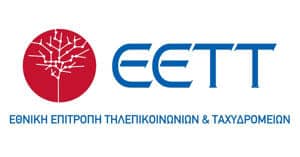H National Telecommunications and Post Commission (EETT) outsourced to two independent consulting firms of international renown, Tarifica and IDATE DigiWorld, assess the current situation and comment on prices of mobile and fixed electronic communications in Greece.
Σthis process the EETT participated exclusively as a source of information and data on the market in cases where this was requested by the two companies, without commenting on the methodologies they used. These surveys are the first in a series of surveys aimed at highlighting a comprehensive and systematic picture of electronic communications pricing issues.

Both studies highlighted the difference observed in Greek market among the prices advertised publicly by them electronic communications providers through their websites (which are the source on which almost all published price comparison studies are based) and the prices that are ultimately offered to consumers as approximated by the average revenue of providers per user (Average Revenue Per User - ARPU), which appear to be lower.
This results in comparisons of Greece with other countries only on the basis of publicly available list prices and without taking into account special offers (e.g. seasonal, retaining and attracting customers) but also other, important factors, such as the quality of the service offered and the cost of network development, can not easily lead to safe conclusions about the cost of electronic communications in Greece.
Η EETT points out that the interpretation of the results of surveys evaluating / comparing the prices of electronic communications between countries should be done with a careful evaluation of the relevant methodologies so as not to create false impressions. Electronic communications are a very dynamic sector with continuous developments in the services and infrastructure sectors which are expected to continue in the future (in the context of the implementation of co-financed projects and private investments that have been announced).

From her data EETT published every six months shows that there is a rapid and steady trend of reducing the cost of electronic communications services in the last 4 years in our country, a fact that is confirmed by the Harmonized Consumer Price Index.
Specifically with the data recently published by ELSTAT for changes between 2020 and 2021 The communications indicator, which includes mobile and fixed electronic communications (with a very large weighting factor) shows by a large margin the largest annual decrease (against 2,5%) When the General Index presents annually increase by 4,4% and most of the other indicators (other groups of goods and services) also show significant increases. For EETT, the pursuit of the most affordable prices for consumers while ensuring the best possible quality of service remains a priority.
Prices of mobile services
Η Tarifica used in the first step the methodology of the 'rational' consumer, which is compatible with the methodology used by o OECD but also the Ευρωπαϊκή Επιτροπή. The Tarifica points out that simple comparisons based on criteria such as "cost per GB" (list price) and the amount of data offered per month do not provide a complete picture.
The analysis was based on prices that are publicly available from providers (eg through their websites). The company in its analysis did not take into account prices resulting from retention and customer offers, gifts and seasonal offers and discounts under combination programs (eg fixed-mobile services).

Based on these, its analysis Tarifica for the prices of mobile communications services in 12 European countries belonging to the same group of countries as per capita GDP, concludes that Greece seems to be one of the four countries with the highest prices.
Then the Tarifica compared the prices he had collected with the detailed data of the Providers' revenues (per service and per subscriber) in Greece. From this comparison Tarifica found that among publicly available prices of Providers and real cost which subscribers are required to pay for their telecommunications services, there were large discrepancies.
To be precise, it found that the average revenue per subscriber (Average Revenue Per User - ARPU), as shown by its market data EETT it would be mathematically impossible to achieve if subscribers paid the advertised retail prices. Therefore the real pricing of mobile communications in Greece is not reflected in the prices presented publicly (e.g. on websites) by providers.
Furthermore, the Tarifica proposes to investigate the effects of network development costs and quality service / network speed in shaping the levels of retail prices, given the challenges posed in these parameters by the intense seasonality of demand and the morphological relief of Greece (e.g. large number of islands).

Η Tarifica refers to a European Commission roaming study on mobile network costs which shows that the network cost per GByte for Greece is the second largest among the countries included in its analysis. In addition, it refers to company data Ookla (which have been established for service quality measurements internationally) according to which Greece is the third best in terms of service quality among the countries included in its analysis.
Prices of fixed communication services
Η IDATE chose to base its assessment of fixed broadband price levels in Greece on the average revenue per user criterion (ARPU) considering that this gives an accurate estimate of the average price that consumers pay for services. In calculating the average revenue per user (ARPU) includes seasonal discounts and promotions.

Also, the IDATE proceeded to further investigate the accessibility of the services for the evaluation of the position of Greece in terms of prices of fixed broadband services in relation to other countries of the The European Union, using the following internationally accepted weighting measures:
- Average revenue per user as a percentage of per capita Gross National Product (GDP).
- Average revenue per user as a percentage of net average monthly salary (adjusted for living costs in terms of purchasing power parity).
- The average income per user as a percentage of the minimum wage.
Comparisons based on these accessibility criteria of prices showed that Greece is consistently ranked in the best positions (1 - 3) among the countries included in the comparison:
- Greece has the second lowest average revenue per user (ARPU) for fixed broadband services (8.68 euro) between 27 countries of the European Union.
- Greece has the third lowest average revenue per user as a percentage of against head of GDP on a monthly basis between the 27 countries of the European Union.
- Greece has it second lowest average revenue per user as a percentage of the average net monthly wage (adjusted for living costs in terms of purchasing power parity) between 26 countries of the European Union (excluding Malta).
- Greece has the lowest average revenue per user as a percentage of the minimum wage between 21 countries of the European Union.
Press Release
 Do not forget to follow it Xiaomi-miui.gr on Google News to be informed immediately about all our new articles! You can also if you use RSS reader, add our page to your list by simply following this link >> https://news.xiaomi-miui.gr/feed/gn
Do not forget to follow it Xiaomi-miui.gr on Google News to be informed immediately about all our new articles! You can also if you use RSS reader, add our page to your list by simply following this link >> https://news.xiaomi-miui.gr/feed/gn





